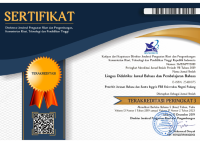Designing Syllabus and Instructional Materials for ESP Students of Online English Conversation Course
 ), Khoiriyah Trianti(2),
), Khoiriyah Trianti(2), (1) Universitas Islam Malang
(2) Universitas Islam Malang
 Corresponding Author
Corresponding Author
Copyright (c) 2021 Lingua Didaktika: Jurnal Bahasa dan Pembelajaran Bahasa
DOI : https://doi.org/10.24036/ld.v15i2.113398
Full Text:
 Language : en
Language : en
Abstract
Keywords
References
Ally, M. (2004). Foundations of Educational Theory for Online Learning. in T. Anderson & F. Elloumi (Eds.), Theory and Practice of Online Learning (pp. 3-31). Athabasca: Athabasca University.
Benavent, G.T. & Sánchez-Reyes, S. (2015). Target Situation as a Key Element for ESP (Law Enforcement) Syllabus Design. Procedia - Social and Behavioral Sciences. 173, (pp. 143-148).
Blakenship, R. & Atkinson, J.K. (2010). Undergraduate Student Online Learning Readiness. International Journal of Education Research. 5 No (2), (pp. 44-54).
Boroujeni, S.A. & Fard, F.M. (2013). A Needs Analysis of English for Specific Purposes (ESP) Course for Adoption of Communicative Language Teaching: (A Case of Iranian First-Year Students of Educational Administration). International Journal of Humanities and Social Science Invention. 2 No (6), (pp. 35-44).
Ismagilova, L.R. & Polyakova, O.V. (2014). The Problem of the Syllabus Design within the Competence Approach Based on the Course "English for Master Degree Students in Economics (Advanced Level)". Procedia - Social and Behavioral Sciences. 152, (pp. 1095-1100).
Latief, M. A. (2009). Penelitian Pengembangan. http://sastra.um.ac.id/wp-content/uploads/2009/09/Pengemb.pdf.
Lawn, M.J. & Lawn. E. (2015). Increasing English Communicative Competence through Online English Conversation Blended e-Learning. International Journal of Information and Education Technology. 5 No (2), (pp. 105-112).
Nakaya, K. & Murota, M. (2013). Development and Evaluation of an Interactive English Conversation Learning System with a Mobile Device Using Topics Based on the Life of the Learner. Research and Practice in Technology Enhanced Learning. 8 No (1), (pp. 65-89).
Parkes, M., Stein, S., & Reading, C. (2015). Student preparedness for university e-learning environments. Internet and Higher Education. 25(April), (pp. 1-10).
Sally & Pradana, S.A. (2019). A Need Analysis English for Business Course. English Education: Jurnal Tadris Bahasa Inggris. 12 No (2), (pp. 139-146).
Setiawan, Y. (2018). Pemanfaatan Kelas Maya untuk Pembelajaran Daring. Jakarta: Kementrian Pendidikan dan Kebudayaan.
Shabiralyani, G., Hasan, K. S., Hamad, N., & Iqbal, N. (2015). Impact of Visual Aids in Enhancing the Learning Process Case Research: District Dera Ghazi Khan. Journal of Education and Practice. 6 No (19), (pp. 226-233).
Sritulanon, A., Chaturongakul, P., & Thammetar, T. 2018. English Speaking Teaching Model in Distance Education. Arab World English Journal. 9 No (3), (pp. 418-433).
Wu, W.V., Yen, L.L., & Marek, M. (2011). Using Online EFL Interaction to Increase Confidence, Motivation, and Ability. Educational Technology & Society. 14 No (3), (pp. 118-129).
Yükselir, C. & Kömür, Ş. (2017). Using Online Videos to Improve Speaking Abilities of EFL Learners. European Journal of Education Studies. 3 No (5), (pp. 255-266).
Zaidoune, S., & Chroqui, R. (2020). ESP Needs Analysis of Business Students in Morocco ESP Needs Analysis of Business Students in Morocco: Case Study of the Faculty of Economics, Social Sciences and Law. International Arab Journal of English for Specific Purposes. 3 No (1), (pp. 40-52).
 Article Metrics
Article Metrics
 Abstract Views : 1260 times
Abstract Views : 1260 times
 PDF Downloaded : 310 times
PDF Downloaded : 310 times
Refbacks
- There are currently no refbacks.
Copyright (c) 2021 Lingua Didaktika: Jurnal Bahasa dan Pembelajaran Bahasa

This work is licensed under a Creative Commons Attribution-NonCommercial 4.0 International License.









